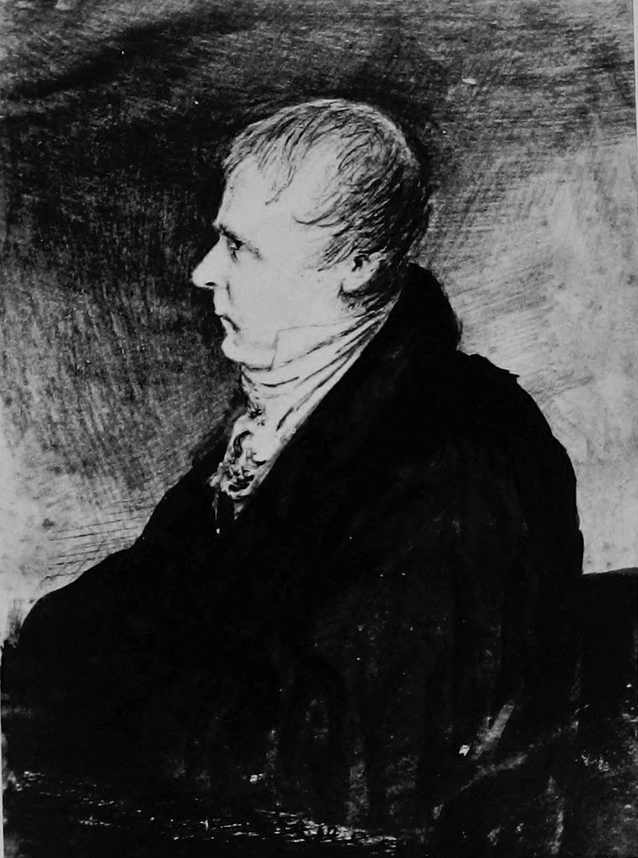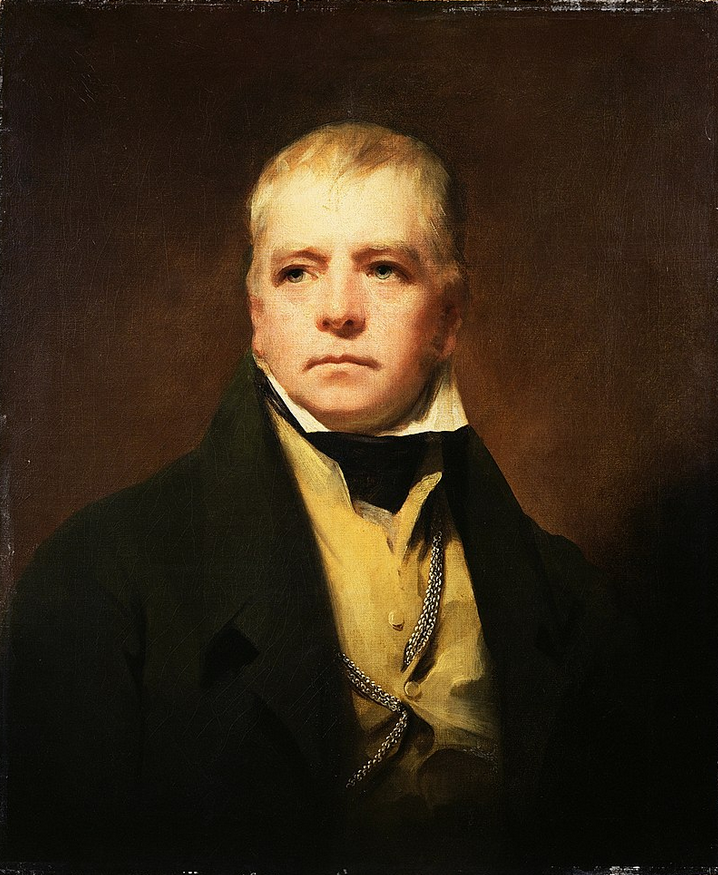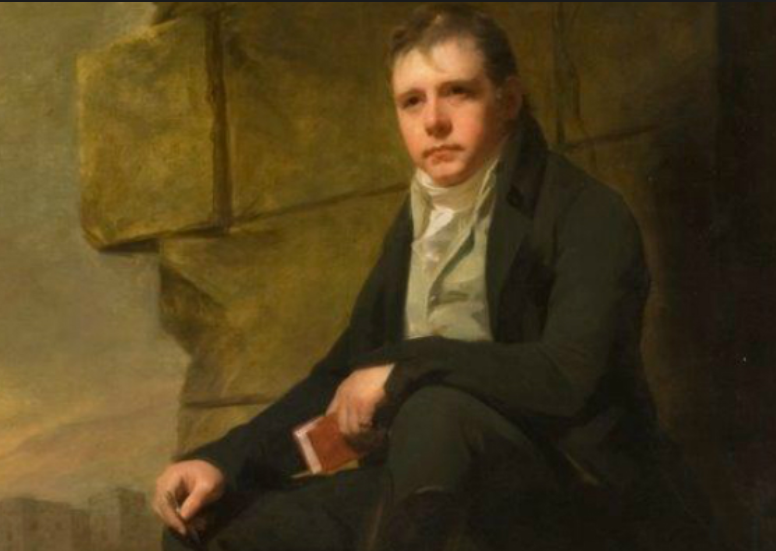Editor’s note: The following is extracted from Gray Days and Gold in England and Scotland, by William Winter (published 1896). All spelling in the original.
The great fame of Scott had been acquired by the time he began to write his Journal, and it rested upon a broad foundation of solid achievement. He was fifty-four years old, having been born August 15, 1771, the same year in which Smollett died. He had been an author for about thirty years,—his first publication, a translation of Bürger’s Lenore, having appeared in 1796, the same year that was darkened by the death of Robert Burns. His social eminence also had been established. He had been sheriff of Selkirk for twenty-five years. He had been for twenty years a clerk of the Court of Session. He had been for five years a baronet, having received that rank from King George the Fourth, who always loved and admired him, in 1820. He had been for fourteen years the owner of Abbotsford, which he bought in 1811, occupied in 1812, and completed in 1824. He was yet to write Woodstock, the six tales called The Chronicles of the Canongate, The Fair Maid of Perth, Anne of Geierstein, Count Robert of Paris, Castle Dangerous, the Life of Napoleon, and the lovely Stories from the History of Scotland. All those works, together with many essays and reviews, were produced by him between 1825 and 1832, while also he was maintaining a considerable correspondence, doing his official duties, writing his Journal, and carrying a suddenly imposed load of debt,—which finally his herculean labours paid,—amounting to £130,000. But between 1805 and 1817 he had written The Lay of the Last Minstrel, Ballads and Lyrical Pieces, Marmion, The Lady of the Lake, The Vision of Don Roderick, Rokeby, The Lord of the Isles, The Field of Waterloo, and Harold the Dauntless,—thus creating a great and diversified body of poetry, then in a new school and a new style, in which, although he has often been imitated, he never has been equalled. Between 1814 and 1825 he had likewise produced Waverley, Guy Mannering, The Antiquary, Old Mortality, The Black Dwarf, Rob Roy, The Heart of Midlothian, A Legend of Montrose, The Bride of Lammermoor, Ivanhoe, The Monastery, The Abbot, Kenilworth, The Pirate, The Fortunes of Nigel, Peveril of the Peak, Quentin Durward, St. Ronan’s Well, Redgauntlet, The Betrothed, and The Talisman. This vast body of fiction was also a new creation in literature, for the English novel prior to Scott’s time was the novel of manners, as chiefly represented by the works of Richardson, Fielding, and Smollett. That admirable author, Miss Jane Porter, had, indeed, written the Scottish Chiefs (1809), in which the note of imagination, as applied to the treatment of historical fact and character, rings true and clear; and probably that excellent book should be remembered as the beginning of English historical romance. Scott himself said that it was the parent, in his mind, of the Waverley Novels. But he surpassed it. Another and perhaps a deeper impulse to the composition of those novels was the consciousness, when Lord Byron, by the publication of Childe Harold (the first and second cantos, in 1812), suddenly checked or eclipsed his immediate popularity as a poet, that it would be necessary for him to strike out a new path. He had begun Waverley in 1805 and thrown the fragment aside. He took it up again in 1814, wrought upon it for three weeks and finished it, and so began the career of “the Great Unknown.” The history of literature presents scarce a comparable example of such splendid industry sustained upon such a high level of endeavour, animated by such glorious genius, and resultant in such a noble and beneficent fruition. The life of Balzac, whom his example inspired, and who may be accounted the greatest of French writers since Voltaire, is perhaps the only life that drifts suggestively into the scholar’s memory, as he thinks of the prodigious labours of Sir Walter Scott.
During the days of his prosperity Scott maintained his manor at Abbotsford and his town-house in Edinburgh, and he frequently migrated from one to the other, dispensing a liberal hospitality at both. He was not one of those authors who think that there is nothing in the world but pen and ink. He esteemed living to be more important than writing about it, and the development of the soul to be a grander result than the production of a book. “I hate an author that’s all author,” said Byron; and in this virtuous sentiment Scott participated. His character and conduct, his unaffected modesty as to his own works, his desire to found a great house and to maintain a stately rank among the land-owners of his country, and as a son of chivalry, have, for this reason, been greatly misunderstood by dull people. They never, indeed, would have found the least fault with him if he had not become a bankrupt; for the mouth of every dunce is stopped by practical success. When he got into debt, though, it was discovered that he ought to have had a higher ambition than the wish to maintain a place among the landed gentry of Scotland; and even though he ultimately paid his debts,—literally working himself to death to do it,—he was not forgiven by that class of censors; and to some extent their chatter of paltry disparagement still survives. While he was rich, however, his halls were thronged with fashion, rank, and renown. Edinburgh, still the stateliest city on which the sun looks down, must have been, in the last days of George the Third, a place of peculiar beauty, opulence, and social brilliancy. Scott, whose father was a Writer to the Signet, and who derived his descent from a good old Border family, the Scotts of Harden, had, from his youth, been accustomed to refined society and elegant surroundings. He was born and reared a gentleman, and a gentleman he never ceased to be. His father’s house was No. 25 George Square, then an aristocratic quarter, now somewhat fallen into the sere and yellow. In that house, as a boy, he saw some of the most distinguished men of the age. In after years, when his fortunes were ripe and his fame as a poet had been established, he drew around himself a kindred class of associates. The record of his life blazes with splendid names. As a lad of fifteen, in 1786, he saw Burns, then twenty-seven, and in the heyday of fame; and he also saw Dugald Stewart, seventeen years his senior. Lord Jeffrey was his contemporary and friend, only two years younger than himself. With Henry Mackenzie, “the Addison of Scotland,”—born in the first year of the last Jacobite rebellion, and therefore twenty-six years his senior,—he lived on terms of cordial friendship. David Hume, who died when Scott was but five years old, was one of the great celebrities of his early days; and doubtless Scott saw the Calton Hill when it was, as Jane Porter remembered it, “a vast green slope, with no other buildings breaking the line of its smooth and magnificent brow but Hume’s monument on one part and the astronomical observatory on the other.” He knew John Home, the author of Douglas, who was his senior by forty-seven years; and among his miscellaneous prose writings there is an effective review of Home’s works, which was written for the Quarterly, in March 1827. Among the actors his especial friends were John Philip Kemble, Mrs. Siddons, the elder Charles Mathews, John Bannister, and Daniel Terry. He knew Yates also, and he saw Miss Foote, Fanny Kemble, and the Mathews of our day as “a clever, rather forward lad.” Goethe was his correspondent. Byron was his friend and fervent admirer. Wordsworth and Moore were among his visitors and especial favourites. The aged Dr. Adam Ferguson was one of his intimates. Hogg, when in trouble, always sought him, and always was helped and comforted. He was the literary sponsor for Thomas Campbell. He met Madame D’Arblay, who was nineteen years his senior, when she was seventy-eight years old; and the author of Evelina talked with him, in the presence of old Samuel Rogers, then sixty-three, about her father, Dr. Burney, and the days of Dr. Johnson. He was honoured with the cordial regard of the great Duke of Wellington, a contemporary, being only two years his senior. He knew Croker, Haydon, Chantrey, Landseer, Sydney Smith, and Theodore Hook. He read Vivian Grey as a new publication and saw Disraeli as a beginner. Coleridge he met and marvelled at. Mrs. Coutts, who had been Harriet Mellon, the singer, and who became the Duchess of St. Albans, was a favourite with him. He knew and liked that caustic critic William Gifford. His relations with Sir Humphry Davy, seven years his senior, were those of kindness. He had a great regard for Lord Castlereagh and Lord Melville. He liked Robert Southey, and he cherished a deep affection for the poet Crabbe, who was twenty-three years older than himself, and who died in the same year. Of Sir George Beaumont, the fond friend and wise patron of Wordsworth, who died in February 1827, Scott wrote that he was “by far the most sensible and pleasing man I ever knew.” Amid a society such as is indicated by those names Scott passed his life. The brilliant days of the Canongate indeed were gone, when all those wynds and closes that fringe the historic avenue from the Castle to Holyrood were as clean as wax, and when the loveliest ladies of Scotland dwelt amongst them, and were borne in their chairs from one house of festivity to another. But New street, once the home of Lord Kames, still retained some touch of its ancient finery. St. John street, where once lived Lord Monboddo and his beautiful daughter, Miss Burnet (immortalised by Burns), and where (at No. 10) Ballantyne often convoked admirers of the unknown author of Waverley, was still a cleanly place. Alison Square, George Square, Buccleuch Place, and kindred quarters were still tenanted by the polished classes of the stately, old-time society of Edinburgh. The movement northward had begun, but as yet it was inconsiderable. In those old drawing-rooms Scott was an habitual visitor, as also he was in many of the contiguous county manors,—in Seton House, Pinkie House, Blackford, Ravelstone, Craigcrook, and Caroline Park, and wherever else the intellect, beauty, rank, and fashion of the Scottish capital assembled; and it is certain that after his marriage, in December 1797, with Miss Charlotte Margaret Carpenter, the scenes of hospitality and of elegant festival were numerous and gay, and were peopled with all that was brightest in the ancient city, at first beneath his roof-tree in Castle street and later beneath his turrets of Abbotsford.

There came a time, however, when the fabric of Scott’s fortunes was to be shattered and his imperial genius bowed into the dust. He had long been a business associate with Constable, his publisher, and also with Ballantyne, his printer. The publishing business failed and they were ruined together. It has long been customary to place the blame for that catastrophe on Constable alone. Mr. Douglas, who has edited the Journal with characteristic discretion and taste, records his opinion that “the three parties, printer, publisher, and author, were equal sharers in the imprudences that led to the disaster;” and he directs attention to the fact that the charge that Constable ruined Scott was not made during the lifetime of either. It matters little now in what way the ruin was induced. Mismanagement caused it, and not misdeed. There was a blunder, but there was no fraud. The honour of all the men concerned stands vindicated before the world. Moreover, the loss was retrieved and the debt was paid,—Scott’s share of it in full: the other shares in part. It is to the period of this ordeal that Scott’s Journal mainly relates. Great though he had been in prosperity, he was to show himself greater amid the storms of disaster and affliction. The earlier pages of the diary are cheerful, vigorous, and confident. The mind of the writer is in no alarm. Presently the sky changes and the tempest breaks; and from that time onward the reader beholds a spectacle, of indomitable will, calm resolution, inflexible purpose, patient endurance, steadfast industry, and productive genius, that is sublime. Many facts of living interest and many gems of subtle thought and happy phrase are found in his daily record. The observations on immortality are in a fine strain. The remarks on music, on dramatic poetry, on the operation of the mental faculties, on painting, and on national characteristics, are freighted with suggestive thought. But the noble presence of the man overshadows even his best words. He lost his fortune in December 1825. His wife died in May 1826. On the pages that immediately follow his note of this bereavement Scott has written occasional words that no one can read unmoved, and that no one who has suffered can read without a pang that is deeper than tears.
But his spirit was slow to break. “Duty to God and to my children,” he said, “must teach me patience.” Once he speaks of “the loneliness of these watches of the night.” Not until his debts were paid and his duties fulfilled would that great soul yield. “I may be bringing on some serious disease,” he remarks, “by working thus hard; if I had once justice done to other folks, I do not much care, only I would not like to suffer long pain.” A little later the old spirit shows itself: “I do not like to have it thought that there is any way in which I can be beaten…. Let us use the time and faculties which God has left us, and trust futurity to His guidance…. I want to finish my task, and then good-night. I will never relax my labour in these affairs either for fear of pain or love of life. I will die a free man, if hard working will do it…. My spirits are neither low nor high—grave, I think, and quiet—a complete twilight of the mind…. God help—but rather God bless—man must help himself…. The best is, the long halt will arrive at last and cure all…. It is my dogged humour to yield little to external circumstances…. I shall never see the three-score and ten, and shall be summed up at a discount. No help for it, and no matter either.” In the mood of mingled submission and resolve denoted by these sentences (which occur at long intervals in the story), he wrought at his task until it was finished. By Woodstock he earned £8000; by the Life of Napoleon £18,000; by other writings still other sums. The details of his toil appear day by day in these simple pages, tragic through all their simplicity. He was a heart-broken man from the hour when his wife died, but he sustained himself by force of will and sense of honour, and he endured and worked till the last, without a murmur; and when he had done his task he laid down his pen and so ended.
The lesson of Scott’s Journal is the most important lesson that experience can teach. It is taught in two words: honour and duty. Nothing is more obvious, from the nature and environment and the consequent condition of the human race, than the fact that this world is not, and was not intended to be, a place of settled happiness. All human beings have troubles, and as the years pass away those troubles become more numerous, more heavy, and more hard to bear. The ordeal through which humanity is passing is an ordeal of discipline for spiritual development. To live in honour, to labour with steadfast industry, and to endure with cheerful patience is to be victorious. Whatever in literature will illustrate this doctrine, and whatever in human example will commend and enforce it, is of transcendent value; and that value is inherent in the example of Sir Walter Scott.
(Go back to Part 1)










I want to thank you for featuring these excerpts on Sir Walter Scott. Though I have read very few of his many works (The Talisman and “The Lay of the Last Minstral” are two favorites), I enjoy the way he tells his stories and the characters he sets before me.
In textbook editions of Scott’s poems and novels, I’ve read encomiums of Scott and his works that are similar to Mr. Winter’s. It seems very odd that a man who was identified as arousing “such deep and sweet feeling(s) of affectionate interest, gentle pleasure, gratitude, and reverential love” at the turn of the last century should be almost forgotten today, doesn’t it? The world needs stories of heroes, grand adventure, sacrifice, and honor to inspire it to great things. Scott gives us all these things if we would only take them.
Thank you again for posting this work – and the many others that you have.
Scott was the first “classic” author that I discovered and enjoyed. That was back in high school, many years ago, but it opened a door into a whole new level of good literature for me. I still recall his words fondly. Of course, the first of his books I read was Ivanhoe.